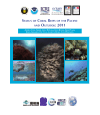Synopsis
Coral reefs are integral to the cultures and nutrition of many Pacific peoples; this report was developed to assist reef conservation for those peoples;
Most coral reefs in the Pacific remain generally healthy, with strong potential for recovery of coral, fish and invertebrate populations after damaging events;
There are, however, many signs of decline, especially on reefs around population centres and in lagoons;
The main drivers of changes in coral cover at larger scales include major ‘natural’ stresses in storms and cyclones, outbreaks of crown-of-thorns seastars (COTS) and coral bleaching driven by climate change;
The trends in coral cover vary considerably from country to country. Current reef status is a reflection of recent damaging events, predominantly ‘natural’, and most damaged reefs appear to be recovering. While trends in reefs can be detected for individual countries and territories, no strong Pacific-wide or regional trend is evident;
At more localised scales, coral reefs are driven by the interactions between many, environmental and human factors. These damaging human factors include: over-exploitation of fishes and invertebrates; sedimentation from poor land-use such as agriculture; mining of coral and sand; urban and tourism developments; and pollution from domestic and farming wastes;
Fishing and harvesting have definitely affected coral reef communities across the Pacific, especially in close proximity of towns, but the magnitude of these effects varies considerably between countries and islands;
Traditional management practices, such as permanent or temporary closure of fishing areas or bans on catching some species, remain particularly strong in the Pacific and are a major force for coral reef conservation;
Many countries and territories have sound legislation to manage coral reef resources, but lack the capacity, logistic resources and sometimes the political will to enforce these laws. However, many countries and territories are making efforts to improve capacity for enforcement and raise awareness of the need for reef conservation; and
Our conclusions are that the longer-term outlook for the coral reefs of the Pacific is considered to be Poor due to threats posed by climate change.
List




 Français
Français